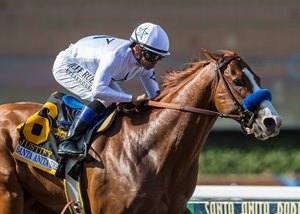Court Filing Aims to Halt CHRB Meeting on Justify


Saying the California Horse Racing Board has no authority or basis to reopen the closed matter looking into Justify 's post-race drug test after his 2018 Santa Anita Derby (G1) win, the connections of the Triple Crown winner have taken legal action to prevent the regulator from conducting a hearing on the issue.
On Oct. 13, Justify's owners, WinStar Farm, China Horse Club, Head of Plains Partners, and Starlight Racing; trainer Bob Baffert; and jockey Mike Smith filed a writ of mandate in California Superior Court, for the county of Los Angeles, Central District, to prevent a CHRB hearing scheduled for Oct. 29.
Also filing were the connections of Baffert trainee Hoppertunity , whose post-race drug test following the 2018 Tokyo City Cup Stakes (G3) at Santa Anita Park also was going to be considered at the hearing.
After Justify's victory in the Santa Anita Derby on April 7, 2018, the CHRB lab, the Maddy Equine Analytical Chemistry Lab at University of California-Davis, reported his sample contained scopolamine. But the CHRB opted not to call a positive based on that finding, following the recommendation of its equine medical director, Dr. Rick Arthur, that the scopolamine in the sample was caused by environmental contamination. (A similar set of circumstances followed Hoppertunity's April 8, 2018, victory in the Tokyo City.)
Mick Ruis, the owner and trainer of 2018 Santa Anita Derby runner-up Bolt d'Oro , filed a lawsuit in January claiming the CHRB failed to follow through on its regulatory duties when no action was taken against Justify following the lab's post-race finding for scopolamine, which is used to treat mild colic and spasms but also can show up as a result of environmental contamination when horses eat jimson weed.
On July 24, attorneys for Ruis said that as part of a preliminary agreement to settle his litigation, the CHRB had agreed to file a complaint against the connections of Justify and conduct a purse disqualification hearing.
The writ of administrative mandamus filed Tuesday by Justify's connections aims to prevent that hearing from being conducted.
"The CHRB has admitted it has issued its complaints and is holding a hearing simply to dispose of a civil action brought against it by a race runner-up and solely as a way to avoid further litigation and expense in that lawsuit," reads Tuesday's filing signed by Amanda Groves, the attorney for Justify's owners. "The CHRB's conduct is arbitrary, capricious, and unlawful and already has put at risk Justify's historic accomplishments, record, and reputation as well as Hoppertunity's reputation and prestigious graded stakes win.
"The CHRB already considered and dismissed these matters over two years ago and has no authority, let alone basis, to reopen them. Its attempt to do so violates the CHRB's own governing statues, regulations, and rules, as well as petitioners' constitutional rights to due process, as set forth below."

Ruis' attorneys argue that even if the scopolamine in Justify's system was caused by environmental contamination, a hearing still should have been conducted to consider forfeiture of purse. In the release, the attorneys contend that CHRB rules require forfeiture of purse and disqualification of a horse who tests positive for a Class 1, 2, or 3 prohibited substance regardless of the trainer's responsibility.
The filing on behalf of the Justify and Hoppertunity connections argues that Arthur correctly determined the cause of the scopolamine to be environmental because atropine was found in the tests as well. Arthur has said that because atropine also was found, it indicates environmental contamination. It also argues that CHRB rules at the time would not authorize disqualification for a scopolamine finding.
The filing also argues that too much time has passed and that conducting a hearing now would be unreasonable.
